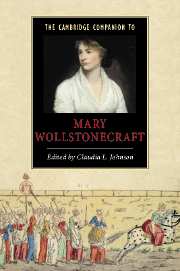Book contents
- Frontmatter
- 1 Introduction
- 2 Mary Wollstonecraft's letters
- 3 Mary Wollstonecraft on education
- 4 Mary Wollstonecraft's Vindications and their political tradition
- 5 Mary Wollstonecraft's French Revolution
- 6 Mary Wollstonecraft's literary reviews
- 7 The religious foundations of Mary Wollstonecraft's feminism
- 8 Mary Wollstonecraft and the literature of advice and instruction
- 9 Mary Wollstonecraft's A Vindication of the Rights of Woman and the women writers of her day
- 10 Mary Wollstonecraft and the poets
- 11 Mary Wollstonecraft's novels
- 12 Letters Written During a Short Residence in Sweden, Norway, and Denmark: traveling with Mary Wollstonecraft
- 13 Mary Wollstonecraft and the sexuality of genius
- 14 Mary Wollstonecraft's reception and legacies
- Select bibliography
- Index
3 - Mary Wollstonecraft on education
Published online by Cambridge University Press: 28 May 2006
- Frontmatter
- 1 Introduction
- 2 Mary Wollstonecraft's letters
- 3 Mary Wollstonecraft on education
- 4 Mary Wollstonecraft's Vindications and their political tradition
- 5 Mary Wollstonecraft's French Revolution
- 6 Mary Wollstonecraft's literary reviews
- 7 The religious foundations of Mary Wollstonecraft's feminism
- 8 Mary Wollstonecraft and the literature of advice and instruction
- 9 Mary Wollstonecraft's A Vindication of the Rights of Woman and the women writers of her day
- 10 Mary Wollstonecraft and the poets
- 11 Mary Wollstonecraft's novels
- 12 Letters Written During a Short Residence in Sweden, Norway, and Denmark: traveling with Mary Wollstonecraft
- 13 Mary Wollstonecraft and the sexuality of genius
- 14 Mary Wollstonecraft's reception and legacies
- Select bibliography
- Index
Summary
A keen and vital concern with education, especially the education of girls and women, runs throughout Mary Wollstonecraft's writing and remains a dominant theme to the abrupt end of her career. The title of her first book, Thoughts on the Education of Daughters, speaks for itself; her single most important work, A Vindication of the Rights of Woman, begins as a plea for the equal education of women and includes an ambitious and farsighted proposal for a national schools system. Both of her novels, Mary and the unfinished Maria, centrally address the self-education of their heroines while seeking to fill a pedagogical role in relation to their female readers. More directly, Wollstonecraft produced a book for children (Original Stories) in the innovative, progressive mode of the day, edited an innovative reader specifically designed for the use of girls, and frequently commented on children's books and educational treatises for the Analytical Review. Among the projects left unfinished at her death were a treatise on the “Management of Infants,” barely begun, and a primer, provisionally entitled “Lessons,” that, if completed, might have changed the early history of the British children's book.
Education was critically important to Wollstonecraft both as a liberal reformer and as a radical theorist and proponent of women’s rights. A broad spectrum of reformist writers and activists – from conservatives wishing to shore up the status quo to “Jacobins” wishing to overturn it – saw education as a, if not the, key locus for promoting social stability or engineering social revolution.
- Type
- Chapter
- Information
- The Cambridge Companion to Mary Wollstonecraft , pp. 24 - 41Publisher: Cambridge University PressPrint publication year: 2002
- 10
- Cited by



